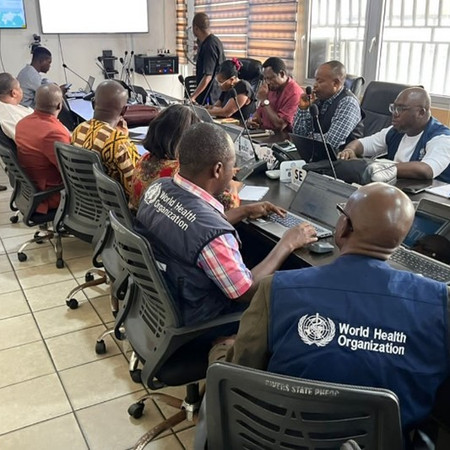
EOC Bi-weekly meeting
Public Health Multi-sectoral & Multi-disciplinary Emergency Operations Centre Holds Bi-weekly Meetings to Strengthen Cholera Outbreak Response.
The Public Health Multi-sectoral and Multi-disciplinary Emergency Operations Centre (EOC) has been conducting bi-weekly meetings to evaluate and enhance the ongoing response to the cholera outbreak. These strategic sessions bring together key stakeholders from various sectors, including health, water and sanitation, emergency management, and development partners, to ensure a coordinated and effective response.
Purpose of the Meetings
The bi-weekly meetings are designed to:
Assess the Current Outbreak Situation: Review the latest epidemiological data from the three affected LGAs, identify hotspots, and monitor the trends in cholera cases and fatalities.
Evaluate Response Strategies: Discuss the effectiveness of current interventions, identify gaps, and adjust strategies to improve outcomes.
Strengthen Coordination and Collaboration: Foster multi-sectoral collaboration to ensure that efforts are harmonized, and resources are optimally utilized.
Ensure Rapid Decision-Making: Facilitate timely decisions on critical response activities, including resource allocation, deployment of response teams, and community engagement strategies.
Key Discussion Areas
During the meetings, stakeholders focus on several critical areas, including:
Surveillance and Data Management: Enhancing real-time data collection and analysis to guide response efforts.
Case Management and Treatment: Improving access to treatment centers, ensuring the availability of medical supplies, and training healthcare workers on cholera case management protocols.
Water, Sanitation, and Hygiene (WASH) Interventions: Addressing the root causes of cholera through improved water quality, sanitation facilities, and hygiene promotion.
Risk Communication and Community Engagement: Disseminating accurate information to the public, promoting preventive behaviors, and involving community leaders in outbreak control efforts.
Impact of the Bi-weekly Meetings
The regular EOC meetings have significantly contributed to:
Enhanced Situational Awareness: Providing a comprehensive understanding of the outbreak dynamics.
Improved Response Efficiency: Enabling rapid deployment of interventions based on real-time data and emerging needs.
Stronger Multi-sectoral Collaboration: Ensuring that all relevant sectors work together towards common outbreak control goals.
The bi-weekly meetings of the Public Health Multi-sectoral and Multi-disciplinary Emergency Operations Centre underscore the importance of coordinated action in managing public health emergencies. By fostering collaboration, ensuring data-driven decision-making, and continuously evaluating response efforts, the EOC plays a pivotal role in mitigating the impact of the cholera outbreak and protecting public health.
Pictures



